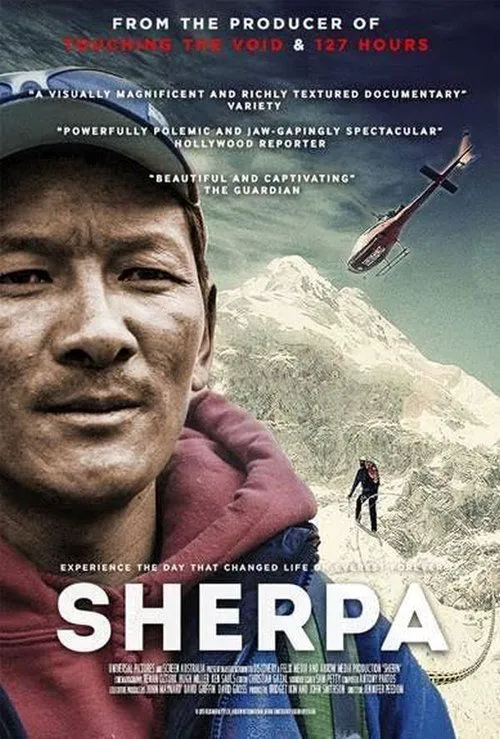Sherpa

Plot
In the gripping 2015 documentary film "Sherpa," director Jennifer Peedom delves into the world of Everest's climbing community, focusing specifically on the Sherpas, the unsung heroes who have been guiding foreigners up the mountain for decades. Peedom and her team set out to tell a story from the Sherpas' perspective, initially planning to film the 2014 climbing season. However, fate had other plans, and what unfolded would become an incredible and harrowing tale of human struggle, bravery, and heartbreak. The film takes viewers on a journey to the roof of the world, the majestic Mount Everest, a behemoth of a mountain that has captivated adventurers from around the globe. For the Sherpas, Everest is not just a mountain - it's a part of their lives, their culture, and their traditions. The documentary highlights the crucial role the Sherpas play in guiding foreign climbers up the mountain, often at great risk to their own lives. As the 2014 climbing season began, tensions were already running high among the climbing community. The Sherpas, led by the brave and outspoken Mingma Sherpa, had grown increasingly frustrated with the disrespect and arrogance displayed by some foreign climbers. A series of incidents had left deep scars, and the Sherpas were fed up with being pushed to the limits, often without adequate respect or compensation. Mingma Sherpa, a veteran mountain guide, had been a voice for change among the Sherpas, advocating for better working conditions, fair pay, and greater recognition for their bravery and expertise. His unwavering commitment to his people's well-being had earned him both admiration and controversy, but he remained steadfast in his fight for Sherpa rights. However, just as the climbing season was about to begin, disaster struck. A huge block of ice, estimated to be over 100,000 kilograms, broke off from the Lhotse Face, sending avalanches careening down the climbing route. The impact was catastrophic, trapping numerous climbers and Sherpas beneath the rubble. As the days passed, the toll of the tragedy became apparent, with 16 Sherpas confirmed dead and countless others injured or missing. The incident, which came to be known as the 2014 Everest avalanche, would go down in history as one of the deadliest seasons on the mountain. The documentary follows the aftermath of the disaster, capturing the emotions, grief, and outrage among the Sherpa community. Mingma Sherpa, who had lost friends and colleagues in the tragedy, remained a beacon of hope, calling for greater accountability and change within the climbing community. Through interviews with the Sherpas, their families, and foreign climbers, the film sheds light on the intricate web of relationships and power dynamics that shape the Everest climbing experience. Peedom's masterful storytelling weaves together a narrative that is both a tribute to the resilience of the Sherpas and a scathing critique of the climbing industry's shortcomings. "Sherpa" is more than just a documentary about a mountain; it's a powerful exploration of human suffering, sacrifice, and the complexities of cultural and economic disparity. By focusing on the Sherpas' experience, Peedom challenges the long-held notion that Everest is just a playground for wealthy adventurers. Instead, the film humanizes the climbers, exposing the harsh realities and unseen struggles that lie beneath the surface of the world's most iconic summit. In the end, "Sherpa" emerges as a poignant tribute to the bravery, dignity, and resilience of the Sherpas, who, despite immense adversity, continue to ascend the highest peak on Earth. As Mingma Sherpa declares, "We're not just porters; we're mountaineers. We're not just workers; we're humans." With courage and conviction, the Sherpas stand tall, defying the elements and demanding recognition, justice, and respect.
Reviews
Recommendations




